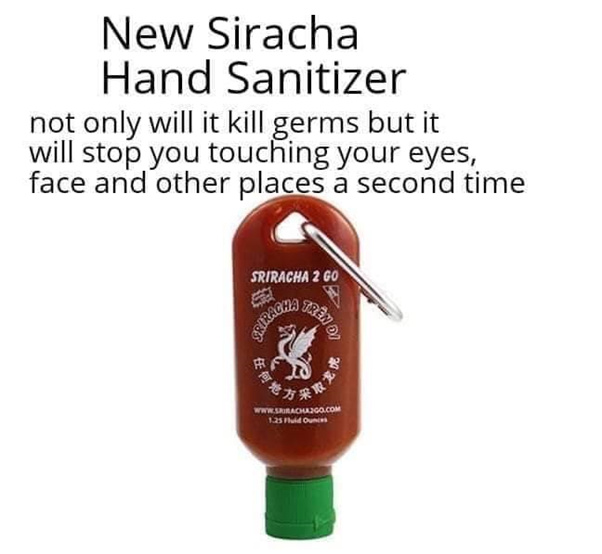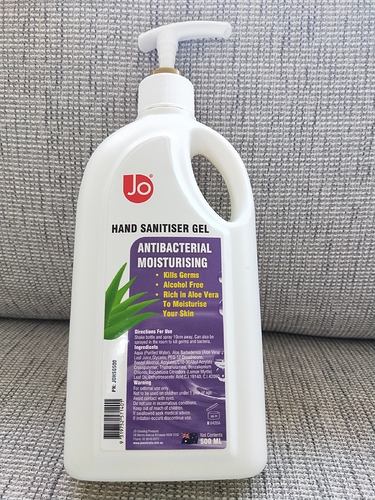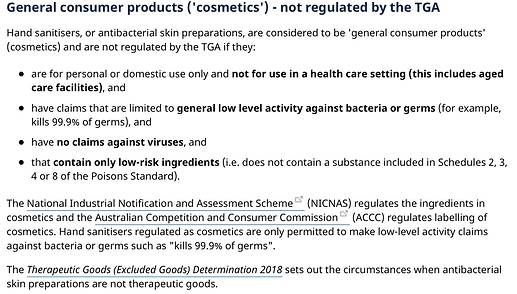No question about the hand washing. However, you can’t wash your hands while out shopping, even visiting the doctor. As a volunteer, when I do a pickup or delivery, what am I supposed to do? Don’t touch you face is obviously an intent, but difficult not to say rub an irritated eye!
Good points, can’t help. But I can share a joke. “Latest hand sanitiser - has Tabasco. Now you won’t DARE touch your face!”
That’s a possibility, but given the duration of the pandemic it’s equally possible that it will still be generally unavailable in six weeks, as worldwide demand soaks up ethanol/isopropyl supply. Probably what these retailers are doing is contracting with a large Chinese manufacturer to deliver a set volume to them, and then using your preorder money to pay the wholesale invoice. You ARE risking your money with a long lead time preorder on a product that is in extreme demand, but it may also deliver you a quantity of hand sanitizer when it is simply not available at retail.
When using alcohol (ethyl mainly) for Aseptic techniques (hard surfaces) we always used 70% v/v (v/v = volume in volume - not v/w or w/v). Alcohol 100% should not be used on the skin as it will tend to “de-fat” the skin and that could make bacterial overgrowth worse. However nothing beats soap and water for at least 20 seconds and don’t forget your thumbs!
pH 7.0
Just as likely that lead times on supplies (hard to get in bulk) as well as logistics to transport.
Good article to give you an idea what hurdles local manufacturing (even if brand new to it) are up against:
Actually find it hard to not make at least 20 seconds going through the motions the WHO recommend
I got methylated spirits from Bunnings. Mixed it 75% with 25% hand soothing lotion. also have a similar mixed at 70/30% with water to clean car handles, steering wheel etc
This morning Colesworths had a few precious boxes of ‘anti bacterial wipes’, none that had any alcohol content but people were still snapping them up.
I can only presume they don’t know that alcohol free bacterial wipes are not efficacious against the virus?
Just wondering what people think about this product… I am a bit suspicious. I have emailed the company for an explanation but no-one has responded. The label says alcohol free hand sanitiser gel even though in the ingredients list there is benzyl alcohol (no % listed) . And the directions say to spray onto skin or in a room but it’s a pump bottle - impossible to spray. We paid $25 for this and I just wonder if it’s a scam!!! The product is very liquid too… Just a bit thicker than water. Am I getting sanitising qualities out of this?
In a word, no. a bit of cleaning power perhaps but that isn’t going to kill any virus you may get on your hands. Stick to the known, I’d say.
There has been plenty of discussion and information on hand sanitisers in the Covid-19 topics.
From (Hand sanitisers: Information for consumers | Therapeutic Goods Administration (TGA))
It’s confusing.
We think of a virus and bacteria as germs.
Unfortunately a product can claim to kill germs when there is no assurance it can kill viruses!
Welcome to the community @Grace001
If you read this topic from the beginning you will find various links to what constitutes a useful sanitiser for coronavirus, and what does not. When a product is clearly labelled with >70% alcohol content it can be reassuring but what many people have been buying is ‘anti bacterial’ sanitiser that addresses bacteria, not viruses.
That does not mean it is useless, it is for a different ‘problem’ than COVID-19/viral cleaning. However this product unusually makes no claims about its efficacy - most anti-bacterial cleaners are labelled to ‘kill 99.9% of bacteria’.
The manufacturer’s web site suggests they cater to a specific commercial clientele. A concern I have is that the company, although well intentioned, might simply have seen a market opportunity and pushed a product out without understanding what they were doing or what is required.
The inconsistency and short comings of the labelling and its absence on the manufacturer web site does not give me confidence.
As for the directions to spray from a pump bottle the market is unfortunately littered with products that are mysteriously labelled in all sorts of magical ways that defy the contents as well as common sense. In cases were there is a question the only authoritative answer is on the product label, and sometime back to the manufacturer, and as the product is not shown on their web site it would require your following up through their contacts details but as you wrote
which to me is another red flag, although you could try their phone. That the phone is a mobile suggests it is a small operation or that is their answer to always needing a fully charged mobile in case of NBN / VOIP being out of service.
Jo products do not seem to be widely sold based on an internet search, indeed a single ‘tool company’ offers them, and FWIW your $25 product is only $45 today!
I hope I have added enough of my own perspective to assist.
Welcome @Grace001
Just to pick up on a point that doesn’t seem to have been addressed …
This is mildly confusing.
The term ‘alcohol’ has two possible meanings.
- A generic class of chemicals.
- A specific chemical (ethanol, also known as ethyl alcohol), which is the fun ingredient in alcoholic drinks :-), um, and the main useful ingredient in hand sanitisers.
My interpretation of “alcohol free” on the label is that it actually means “ethanol free”.
There is a third chemical that can be relevant, namely methanol (also known as methyl alcohol). Methanol is what is added to ethanol to make “methylated spirits”. So the “spirits” are ethanol and the “methylated” is methanol. The methanol serves no functional purpose in the product for its intended use. The sole purpose is to discourage recreational use of methylated spirits (although technically it also has the effect of avoiding alcohol excise tax on the product). Methanol is toxic to humans when swallowed.
So a hand sanitiser may also contain a small amount of methanol, or other similar poison, to discourage some idiot somewhere from ingesting hand sanitiser in order to become intoxicated.
I would say that this is their intention as there are those who don’t partake in ethanol consumption either by choice or for cultural or religious beliefs.
Ethanol can be absorbed by the skin and taken into the blood stream…which may pose an issue for the above individuals.
Also, ethanol use on the skin is associated with skin irritation or contact dermatitis, especially in humans with an aldehyde dehydrogenase (ALDH) deficiency.
Benzyl alcohol is used as a preservative, viscosity reducing agent, fragrance (yes it has a pleasant mild smell) and as a solvent. It metalbolises to Benzoic Acid and finally is excreted as hippuric acid. For the purposes of alcohol free and as noted by @person, is that they typically mean free from methanol, ethanol or iso-propyl alcohol or similar alcohol compounds.
Benzyl alcohol is I think approved for “organic” goods as it or it’s derivatives eg Benzoic Acid are found naturally in plants eg Balsam of Peru.
Because hand sanitiser is normally high in alcohol(s), it’s flammable. Under most lighting conditions, the flame is not visible. The sanitiser burns a bit like napalm, though it’s evidently easier to extinguish.
Apparently there are moves afoot to keep cricketers from spreading coronavirus during matches including banning bowlers from using saliva to polish the ball or even using disinfectant. The question is if they treat their balls with sanitiser will they still get them to swing both ways?
Yes, saliva is banned. Sweat is not, as I understand it. Sandpaper remains banned. LOL.
I hadn’t specifically heard that there were plans to disinfect the ball. Who knows what effect that might have on swing. I don’t think disinfecting the ball is totally necessary as long as a range of other measures are taken e.g. regular temperature screening of players e.g. regular actual testing of players and regular general health monitoring of players e.g. hand sanitiser for the players.
I’m, ah, playing your post with a straight bat.
And
It already sounds like it’s not cricket, starting with the suggestions of official ball tampering.
They could just require every player to wear gloves.
The keeper has gloves, the batsman has gloves, just issue some to the bowlers and fielders to keep it consistent. Come in spinner?
Edit
You’d still need to observe social distancing. It’s a non contact sport. To use hand sanitiser and have good hand hygiene. But it will save those balls from the effects of an alcohol based rub.
It is early morning and this is the first post I read. For a few seconds I had lost that the remarks were about cricket. Careful with those quotes 



